0 133119 133127 133133 133137 133143 133145 133149 133155 133157 133163 133169 133173 133175 133179 133185 133187 133193 133197 133199 133203 133205 133209 133211 133213 133214 133215 133217 133218 133219 133221 133223 133227 133229 133233 133235 133239 133245 133247 133253 133257 133259 133263 133269 133275 133277 133283 133287 133289 133295 133299 133305 133313 151629

 ),并在其下面写出该加的词。
),并在其下面写出该加的词。
